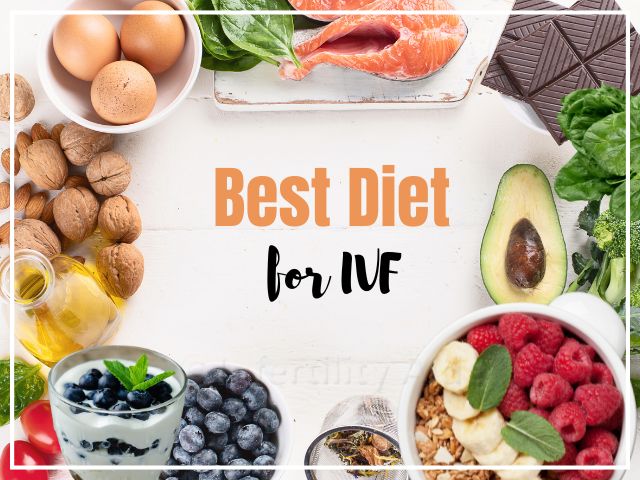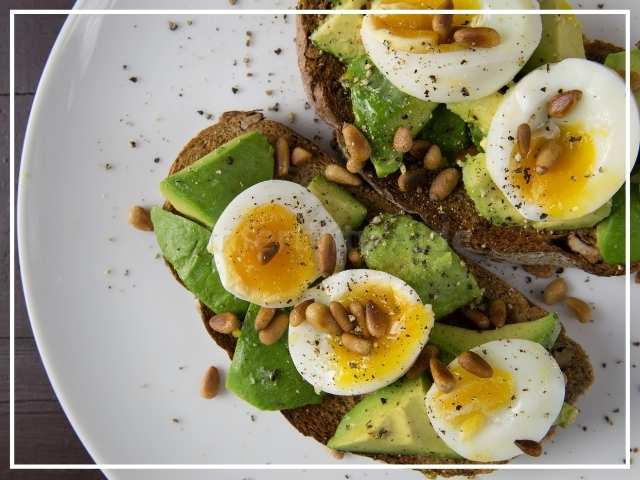Changing your dietary habits can help improve your chances of success with IVF treatment and prepare your body for a successful pregnancy. So, what is the best diet for IVF? Let’s learn:
An IVF diet that is balanced and nutritious, can have a significant impact on not only your general health, but also on your fertility.
Given how emotionally and financially draining IVF treatment can be, making some small adjustments to your diet in advance could really be worthwhile for you.

How does diet help IVF success?
Research has established that eating healthy can boost our fertility and chances of having a healthy and safe pregnancy (1).
The benefits to adopting a healthy IVF diet prior to and during your treatment include:
- Providing vitamins and minerals needed for optimum health of the egg and sperm
- Providing antioxidants which can protect the egg and sperm from damage induced by free radicals
- Providing essential fats which enable the proper production and function of reproductive hormones. This ensures optimal hormone balance in the body and can be particularly beneficial in cases of hormone imbalance, such as infertility in PCOS patients.
- Ensures optimal general health by providing anti-inflammatory and anti-ageing effects
- Ensures the body is healthy and strong in preparation for the early stages of pregnancy
When should I start my IVF diet?
The usual recommendation is to start the IVF diet about 2-3 months before treatment.
This is to ensure that your body is of optimal health and strength and there is time to stabilize any hormonal imbalances, which may affect the success of your treatment.
But what should you be eating in a fertility diet?
What foods help with IVF success?
You need a healthy balance of macro and micro-nutrients.
Healthy fats – Fatty fish, like salmon, mackerel, and tuna are rich in Omega-3 fatty acids, which play an important role in maintaining egg health. Vegetarians can consider having more nuts, Avocado, Olive oil, etc.

Protein – Eggs, lean meats, sea food, cottage cheese, tofu, beans, yogurt, lentils, full-fat milk are all good sources of protein.
A diet that is low in protein can lead to fewer mitochondria (the powerhouse of the cells) but a diet that is overly high in protein can also cause infertility by disrupting a female’s hormonal balance. So you need to just have the adequate amount of protein in your diet.
Additionally, women with high consumption of red meat and poultry have been found to have an increased risk of anovulation, leading to infertility (2). Replacing these with plan protein reduced the incidence of infertility in these women.
Carbohydrates – Carbohydrates are but lowering their quantity in your daily diet can have a beneficial effect on your fertility.
A diet with a high glycemic load causes a risk of anovulation and infertility (3), whereas a keto diet has been shown to improve fertility in many women.
If you do not have any major Gluten sensitivity, you don’t need to totally eliminate carbs from your diet but you can switch to healthier forms of carbs as derived from fruits and salads, whole grains, potatoes, yams, corn, beetroots, brown rice, raisins, etc.
Vitamins and minerals – The micronutrients play and important part in your fertility and healthy menstrual cycles and they are not produced by your body. You must ensure to include the below food items to have a healthy balance of the required vitamins and minerals for your fertility.
Vitamins for fertility
- Vitamin B-9 or Folate/Folic acid – It is important in early pregnancy, cellular health and growth, and formation of red blood cells. Folate can be found in spinach, broccoli, green leafy vegetables, fortified grains and cereals, asparagus, beans, peanuts, legumes, sunflower seeds, fruits and juices, etc.
- Vitamin B6 and B12 – Researchers found that regular supplementation of folic acid, along with vitamins B6 and B12, helps reduce the incidence of recurrent pregnancy loss in women who had multiple miscarriages (4). Both of these vitamins are important for our cells to survive and grow and they can be found in meat, fish, poultry, soya, legumes, tofu, bananas.
- Vitamin C – Vitamin C is a strong anti-oxidant that can help fight free radicals and it can help improve gamete quality in both men and women. Citrus fruits, bell peppers, berries, tomatoes, Brussels sprouts are all good sources of Vitamin C.
- Vitamin D – It is important for normal hormonal function, production of AMH, improving egg quality, and helping in easier conception. It is found in fatty fish, cod liver oil, egg yolks, cheese, mushrooms.
- Vitamin E – Also, a strong anti-oxidant, it helps improve the endometrial environment and egg quality in women and boost sperm count and motility in men. Foods that are rich in Vitamin E include spinach, red sweet peppers, almonds, wheat germ oil, avocado, peanuts, sunflower seeds, cabbage, milk, kale, etc.
Minerals for fertility
- Calcium – Found in milk, yogurt, cheese, green vegetables, salmon, etc. It is important for formation of gametes and development of the embryo and fetus (5). It is also important for spermatogenesis in men.
- Iron – Adequate iron levels are important for endometrial health and to improve ovulation (6) in women. Iron can be found in spinach, beets, peas, broccoli, string beans, kale, etc.
- Magnesium – Magnesium helps with glucose metabolism and especially helpful in women with PCOS. Spinach, almonds, peanuts, legumes, chocolate, black beans, seeds, etc all are good sources of Magnesium.
- Iodine – It is important for the proper thyroid function and the growth and development of the fetus. Iodine is found in Iodized salt, seafood, and milk.
- Selenium – Selenium helps by reducing the oxidative stress on cells and helps in the growth and maturation of female eggs. It is found in lean meats, eggs, beans, peas, nuts, seeds, and soy products.
- Zinc – A deficiency of Zinc results in poor quality, immature eggs (7). In men, Zinc helps with increasing testosterone levels and improving sperm count, quality, and motility. Oysters are a richest source of Zinc, and for vegetarians, it can be found in nuts, cereals, whole grains, dairy, chickpeas.
Can I eat eggs for IVF?
Eggs are a great source of protein and they contain all essential amino acids. They are also packed with choline, which important for cellular health and brain development of the fetus.
You must eat the whole egg, as the yolk is rich in vitamin D, which is associated with better IVF outcomes, healthier pregnancies, and fetal development (8).
Infact, even after a successful pregnancy, vitamin D is supplemented if the female is somehow deficient in it.
Does drinking water help IVF?
Water helps in better circulation and maintaining a good metabolism. Dehydration can result in early uterine contractions, which are harmful for conception and pregnancy.
Adequate hydration is also important for males undergoing IVF as dehydration may result in lower semen volume and poorer quality of sperm.
Should I drink milk during IVF?
Milk is rich in important vitamins and minerals like calcium and is also a good source of protein for vegetarians.
2-3 servings of dairy can be comfortable consumed when you’re trying to conceive. In women over 35, regular milk consumption was associated with higher live birth rate in IVF (9).
What foods should I avoid during IVF?
- Alcohol – Alcohol can affect the viability of your eggs, making them difficult to fertilize. In females, alcohol consumption during IVF has been associated with 13% reduction in number of eggs retrieved, and almost thrice the risk of IVF failure. Even in men, alcohol consumption was found to increase the risk of IVF failure by 2.28 times (10).
- Processed sugars – Researchers in Boston found that one portion of sugary soda a day, resulted in fewer number of eggs, poorer quality of embryos, and around 15% reduction in live birth rates in women undergoing IVF (11).
- Caffeine – Moderate consumption of caffeinated beverages did not affect IVF outcomes, a study found (12). However, researchers cautioned against excessive caffeine intake as it may impact the number of eggs retrieved and also affect your metabolism ahead of the procedure.
- Processed meat – A study found thatconsumption of processed meat was associated malfunctioning of male sperm and reduction in its ability to fertilize an egg (13).
A few months before your treatment, you should switch to the best diet for IVF, start exercising, and get enough rest. For consultation with an IVF expert to improve your chances of IVF success, get in touch using the red contact button on this page.
References
- Panth, N., Gavarkovs, A., Tamez, M., & Mattei, J. (2018). The Influence of Diet on Fertility and the Implications for Public Health Nutrition in the United States. Frontiers in public health, 6, 211. https://doi.org/10.3389/fpubh.2018.00211
- Chavarro, J. E., Rich-Edwards, J. W., Rosner, B. A., & Willett, W. C. (2008). Protein intake and ovulatory infertility. American journal of obstetrics and gynecology, 198(2), 210.e1–210.e2107. https://doi.org/10.1016/j.ajog.2007.06.057
- Chavarro J. E. (2020). Carbohydrates and fertility: just the tip of the (fertility) iceberg. The American journal of clinical nutrition, 112(1), 1–2. https://doi.org/10.1093/ajcn/nqaa039
- Danielius Serapinas, Evelina Boreikaite, Agne Bartkeviciute, Rita Bandzeviciene, Mindaugas Silkunas, Daiva Bartkeviciene, The importance of folate, vitamins B6 and B12 for the lowering of homocysteine concentrations for patients with recurrent pregnancy loss and MTHFR mutations, Reproductive Toxicology https://doi.org/10.1016/j.reprotox.2017.07.001
- Safari, H., Hajian, M., Nasr-Esfahani, M.H. et al. Vitamin D and calcium, together and separately, play roles in female reproductive performance. Sci Rep 12, 10470 (2022). https://doi.org/10.1038/s41598-022-14708-7
- Skoracka, K., Ratajczak, A. E., Rychter, A. M., Dobrowolska, A., & Krela-Kaźmierczak, I. (2021). Female Fertility and the Nutritional Approach: The Most Essential Aspects. Advances in nutrition (Bethesda, Md.), 12(6), 2372–2386. https://doi.org/10.1093/advances/nmab068
- Garner, T. B., Hester, J. M., Carothers, A., & Diaz, F. J. (2021). Role of zinc in female reproduction. Biology of reproduction, 104(5), 976–994. https://doi.org/10.1093/biolre/ioab023
- Várbíró, S., Takács, I., Tűű, L., Nas, K., Sziva, R. E., Hetthéssy, J. R., & Török, M. (2022). Effects of Vitamin D on Fertility, Pregnancy and Polycystic Ovary Syndrome-A Review. Nutrients, 14(8), 1649. https://doi.org/10.3390/nu14081649
- Afeiche, M. C., Chiu, Y. H., Gaskins, A. J., Williams, P. L., Souter, I., Wright, D. L., Hauser, R., Chavarro, J. E., & EARTH Study team (2016). Dairy intake in relation to in vitro fertilization outcomes among women from a fertility clinic. Human reproduction (Oxford, England), 31(3), 563–571. https://doi.org/10.1093/humrep/dev344
- Klonoff-Cohen, H., Lam-Kruglick, P., & Gonzalez, C. (2003). Effects of maternal and paternal alcohol consumption on the success rates of in vitro fertilization and gamete intrafallopian transfer. Fertility and sterility, 79(2), 330–339. https://doi.org/10.1016/s0015-0282(02)04582-x
- Ronit Machtinger, M.D, Audrey J. Gaskins, Sc.D, Abdallah Mansur, M.Sc, Andrea A. Baccarelli M.D, Ph.D, Russ Hauser, M.D, Sc.D, Jorge E. Chavarro, M.D. Association between preconception maternal beverage intake and in vitro fertilization outcomes DOI : https://doi.org/10.1016/j.fertnstert.2017.09.007
- Ricci, E., Noli, S., Cipriani, S., La Vecchia, I., Chiaffarino, F., Ferrari, S., Mauri, P. A., Reschini, M., Fedele, L., & Parazzini, F. (2018). Maternal and Paternal Caffeine Intake and ART Outcomes in Couples Referring to an Italian Fertility Clinic: A Prospective Cohort. Nutrients, 10(8), 1116. https://doi.org/10.3390/nu10081116
- Wei Xia, Ph.D, Yu-Han Chiu, M.D, Paige L. Williams, Ph.D, Cigdem Tanrikut, M.D, Russ Hauser, M.D, Jorge E. Chavarro, M.D, Men’s meat intake and treatment outcomes among couples undergoing assisted reproduction DOI: https://doi.org/10.1016/j.fertnstert.2015.06.037
Reviewd by: Dr. Meenakshi, PhD